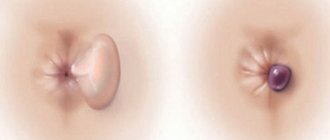Unfortunately, pregnancy is not only an opportunity to see with trepidation the first movement of the fetus during an ultrasound procedure and experience exciting anticipation during the period when a specialist is busy determining the sex of the unborn child.
Carrying a baby is a real test both morally and physically , because over the course of nine months she will have to go through many obstacles.
They are associated with changes in hormones, restructuring of the body, the appearance of unstable conditions and various pathologies. Quite often women face this problem of constipation.
This phenomenon is well known to pregnant women who experience discomfort every morning when visiting the bathroom. But if for an ordinary person constipation is only a minor problem, then for a pregnant woman it can become a real disaster, which can lead to dangerous consequences.
In order to prevent pathologies and not put the health of the unborn child at stake, you need to have information about diagnostic methods, treatment, as well as the causes of constipation. They will be outlined below.
What symptoms indicate problems?
When diagnosing constipation, it is important not to make a mistake, because the frequency of bowel movements varies from person to person. Therefore, talking about the presence of a problem only on the basis of rare stools is not always correct, because what is normal for one person is unacceptable for another.
To exclude an erroneous diagnosis, doctors advise paying attention to the following alarm bells, which may indicate that it is time to start treating constipation during pregnancy.
This:
- lack of feeling of relief after bowel movement;
- hard dry stool;
- small volume of feces;
- reduction in the frequency of bowel movements compared to the period preceding pregnancy.
During pregnancy, expectant mothers do not always immediately experience all of the listed symptoms indicating the presence of constipation. Women in the early stages of pregnancy may experience various combinations of these symptoms, however, the presence of just one bell is a reason to pay attention to the problem and make an appointment with a doctor.
Causes of bowel problems
In the first trimester of pregnancy, the cause of constipation is considered to be a high level of progesterone, which, in order to prevent miscarriage, has a relaxing effect on the uterus. In the second and third trimesters, the reason changes - now it is a compressive effect on the intestines from the growing uterus. As a result, the movement of feces becomes difficult.
Other factors that may cause constipation:
- Iron supplements prescribed to prevent anemia can cause constipation, since iron itself strengthens the intestines.
- Long-term use of Papaverine and Drotaverine (No-shpa) can cause constipation.
- Added to the stresses that are characteristic of modern busy life are worries about the child’s health and anxiety associated with the expected birth. This may disrupt the functioning of the gastrointestinal tract.
- The work of a pregnant woman's intestines slows down, especially in the second trimester, with little physical activity or bed rest, which is prescribed to women to prevent the threat of miscarriage.
- Nutrition and fluid intake affect the functioning of the stomach and intestines, even regardless of pregnancy.
Why does constipation occur during early pregnancy?
The previous section identified symptoms that help diagnose constipation after the problem has been identified, which will be discussed below. So, you should start by looking for the cause of the disease, and only then begin to treat it.
According to experts, the causes of constipation during early pregnancy are as follows:
1) The predominance of a sedentary lifestyle.
Before pregnancy, a woman may not encounter the problem of constipation because she is physically active, moves a lot and plays sports. But due to physiological changes in the process of gestation, the old life remains in the past.
Some women are afraid to move due to the threat of miscarriage, others prefer a leisurely pastime due to their temperament. However, doctors believe that in the absence of pathologies during pregnancy, it is necessary to maintain at least minimal physical activity, which will help improve the functioning of the internal organs in the body, which can last for several days.
2). Changes in hormonal levels.
An increase in the body of hormones responsible for relaxing the intestinal muscles is observed in all women. As a result, problems arise with its peristalsis and emptying.
3). Iron and calcium deficiency.
These elements are needed to support digestion. When they are deficient, various disorders occur, including constipation.
4). Dehydration.
A small amount of water drunk during the day during constipation has an adverse effect on intestinal function. In view of this, doctors emphasize the importance of maintaining a drinking regime when carrying a child.
5). Stressful situations.
This factor also negatively affects the frequency of bowel movements during constipation, and since many pregnant women experience severe anxiety and anxiety during pregnancy, stress is considered one of the indirect culprits of constipation.
6). Diseases.
Expectant mothers are not insured against constipation caused by illness. Hemorrhoids, anal fissures, uterine tone and other ailments also deprive the intestines of the ability to work normally.
Why is constipation dangerous during pregnancy?
Some doctors believe that constipation can provoke labor in a pregnant woman due to strong straining during bowel movements. Therefore, there is a danger of premature birth.
The norm is the absence of stool for 3 days. With a longer delay in defecation, there is a risk of developing intoxication and the formation of fecal plugs. Toxins accumulated in waste products can enter the bloodstream, poisoning the body of the expectant mother and child.
A consequence of weekly constipation is often the development of hemorrhoids. Under the influence of hard and dry feces, the mucous membrane of the rectal intestine is injured, which leads to inflammation of the hemorrhoids.
The onset of constipation is dangerous due to disruption of the intestinal microbiota, which leads to the development of dysbiosis.
Is constipation a delicate problem or a dangerous illness?
Women may experience constipation during late pregnancy and may also experience the problem in the first weeks of their new position. Moreover, both constipation in the early stages and constipation at 8–9 months have a negative impact on the mother’s well-being and can negatively affect the baby’s health. In any case, the condition is not harmless and carries a certain risk.
Here is just a short list of possible complications:
- intoxication of the body;
- discomfort;
- heaviness in the stomach;
- unwanted disturbances;
- the risk of hemorrhoids or injury to the fetus as a result of strong straining during bowel movements;
- increased risk of developing diseases.
Reasons for the development of constipation in pregnant women
The reasons for the development of constipation during pregnancy may differ at different stages. Starting from the second trimester, more persistent constipation is observed, since the condition is provoked by several factors at once.
In 1st trimester
In the early stages of pregnancy, constipation is caused by the hormone progesterone, which is produced in increased quantities during gestation. It is responsible for reducing the tone of the uterus, eliminating the risk of miscarriage. A “side effect” of this hormone influence is relaxation of the intestinal muscles, which leads to a decrease in peristalsis.
Some women experience uterine hypertonicity in the first trimester, which can lead to the development of spastic constipation.
Another reason for the development of constipation in pregnant women is a change in eating habits. During pregnancy, a woman's diet often contains a lot of protein foods and few foods rich in fiber.
In the 2nd trimester
From 12-13 weeks of gestation, progesterone levels increase sharply. During this period of pregnancy, the risk of constipation is high.
A woman begins to move less from the second trimester. A decrease in physical activity in pregnant women is inherent in nature itself for the purpose of successful gestation. This in turn can negatively affect bowel function.
Constipation during pregnancy in the 2nd trimester is often caused by iron supplements prescribed by the attending physician.
In the 3rd trimester
In the third trimester, progesterone levels continue to rise, further reducing the contractile activity of the uterus and intestines. It becomes more difficult for the digestive tract to digest food and move it to the distal sections.
The condition is aggravated by the increasing pressure that the enlarged uterus and fetus exert on the intestines. The reproductive organ compresses the lower parts of the digestive tract, thereby disrupting its peristalsis.
In the later stages of pregnancy, it becomes difficult for women to perform physical activity. Expectant mothers begin to lead a sedentary lifestyle. This negatively affects intestinal motility.
In the third trimester, pregnant women are more susceptible to stress as hormonal levels change. Emotional outbursts, in turn, can also cause constipation.
Often the cause of bowel dysfunction during gestation is hemorrhoids. The fetus puts pressure on the rectum, which often provokes inflammation of the hemorrhoids as a result of venous stagnation.
Diet is the first assistant in the fight against disease
Before looking for a remedy for constipation during pregnancy at the nearest pharmacy, a pregnant woman should analyze her diet, because errors in its preparation can negatively affect the regular functioning of the intestines.
The following products should be excluded:
You need to give preference to dishes that help establish normal digestion and help prevent problems with timely bowel movements, as this will have a positive effect not only on this disease, but also on your health.
A pregnant woman needs:
- fresh vegetables, fruits, leafy greens;
- prunes;
- foods rich in bran and dietary fiber;
- dairy products;
- some types of cereals, etc.
What if proper nutrition is not enough?
In some cases, changing your diet does not give the desired result. Then doctors select a course of medication treatment for women.
In most cases, the doctor recommends using suppositories for constipation during pregnancy, which, unlike pills, are gentle and safe. They have a local effect on the intestines and promote its emptying.
Doctors are skeptical about the use of more serious drugs, because during pregnancy they can aggravate the condition of the mother and fetus. In particular, the tablets can have the following side effects:
Folk remedies for constipation during pregnancy
In the old days, pharmacology was not so developed and to combat constipation, women used proven remedies from traditional medicine. They can still be used today. Thus, a decoction based on prunes can play a good role in the process of normalizing digestion.
It is prepared as follows - equal proportions of prunes, oatmeal and beets are taken. Next, the components are mixed, filled with water and placed on the stove. After boiling, the broth should be brought to readiness over low heat for an hour. You need to consume the prepared dish one glass at night.
A mixture of honey and dried fruits also has a beneficial effect on the digestion process. To prepare it you need raisins, dried apricots and prunes. They are crushed and mixed with honey. For 300 grams of dried fruit you need to use about two tablespoons of honey. The mixture should be consumed before bedtime with water.
These methods have a mild effect, unlike other folk remedies against constipation, such as an infusion of senna leaves, buckthorn bark or rhubarb stems. Therefore, doctors recommend strictly avoiding the use of the latter methods during pregnancy.











